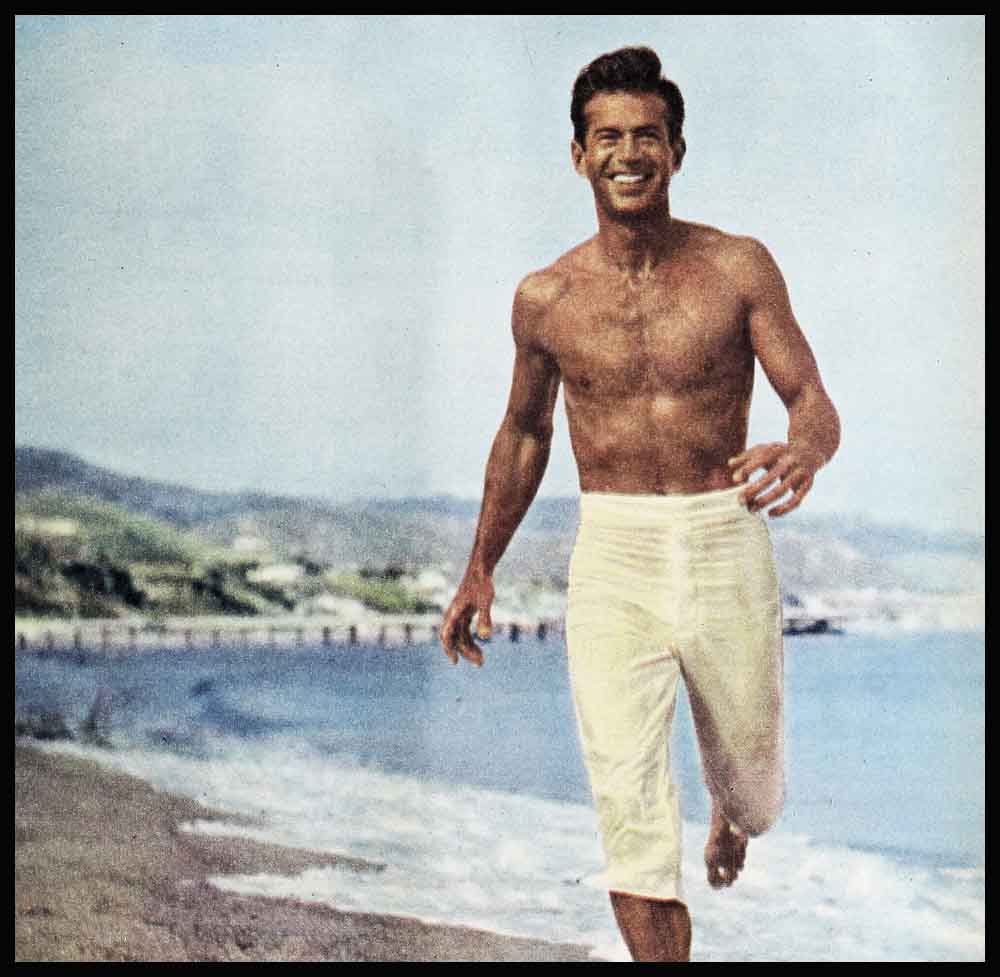
Are You The Girl I’m Looking For?
It all happened this way: One day I was having lunch in a small Italian restaurant on New York’s East Side with the editors of Photoplay. We’d polished off the movies with the main course (I’d gotten a few of my gripes about CinemaScope off my chest) and by the time the dessert—zabaglioni—came along, we’d gotten around to love. (I have a few pet ideas on that subject, too.) From love to this article was as easy as getting from the last spoonful of zabaglioni to the first sip of demi-tasse. It was a natural. For when I said I’d like to write an article about what we’d been discussing—all the things that are important to me and, I hope, to the girl I’ll someday marry—the editor asked if I would put my thoughts on paper, exactly the way I’d spoken them, without “editing” myself or restraining myself at all.
Would I? Does a bird like to fly? Does a fish like to swim? Does an actor like to talk? In other words, I would! For one thing, Ira tired of “staying in my own department” and letting someone else do the writing. I’m also tired of being polite—saying the right, right thing and never really getting a chance to say, honestly, what I feel and think.
I think love—unlike what you learn in geometry—is more than the sum of all its parts. For if it’s a good relationship, then each of the two people involved is a better person because of it. Being in love with someone helps bring out the better you. In little ways you find yourself becoming the person you’ve always wanted to be.
To me, love is something outgoing and giving. It helps us to grow into better human beings.
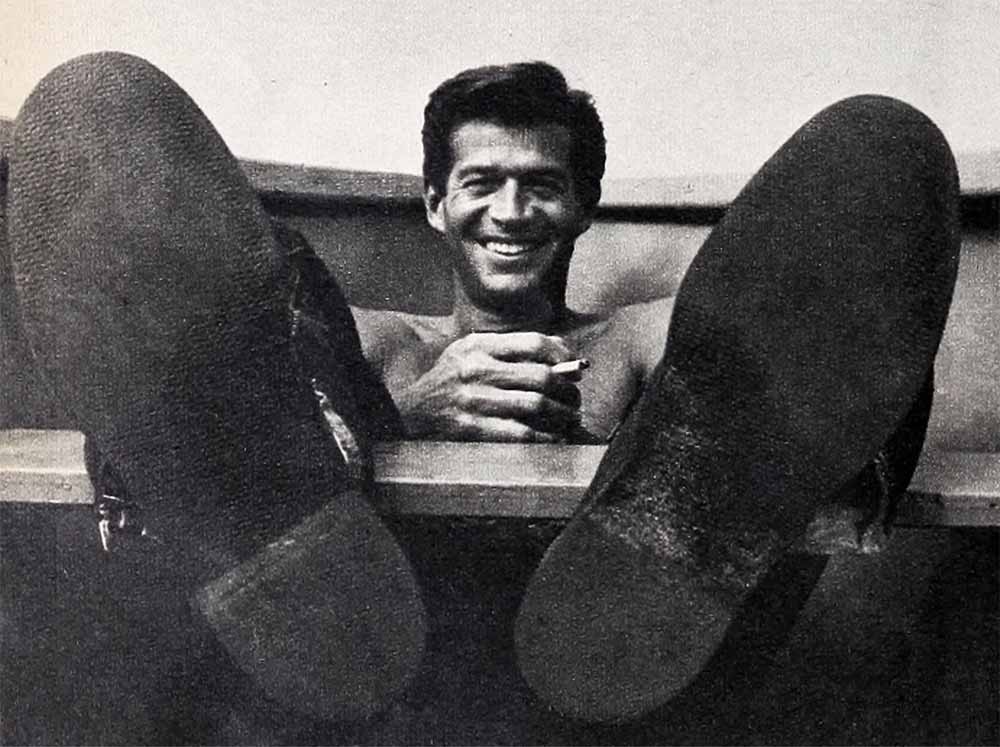
I think the first stage of love, like the first stage of friendship, consists of two people getting to know all about each other. I don’t know what you’re like, but I’ve been living with myself for umpteen years, so I should have a pretty fair idea of what makes me tick. What am I like? For one thing, I’m a California boy. I was born in Pasadena, just a stone’s throw from Hollywood. If you like easy living, a swim in the Pacific in the morning (as above, with Ingrid Goude), sending down to Barone’s afterward for a plate of spaghetti when you’re ravenously hungry—or settling for hot dogs on paper plates when you aren’t—then you’d like my way, the California way, of living.
What else? Well, as you may gather, I love swimming and do lots of it (and it’s good for me) . . , I hate nightclubs and won’t go into them unless the entertainment is exceptional. (It hardly ever is.) I . . . I like people who are honest and I can’t stand phonies . . . I like fried pork chops and creamed. corn and ice cream sundaes at Wil Wright’s . . . and I hate turnips. I don’t like weight-lifting, but I do it (it’s good for me).
There are a few things I could improve on, like learning to temper my words with tact, but there’d be no point in fooling you. After marriage, I’m likely to wind up being the same person I was before we’d met. I don’t think I’m likely to change much. I don’t change my mind quickly. I kind of think things through and sleep on them. It takes me a long time to make up my mind, but when I do, it stays made up.
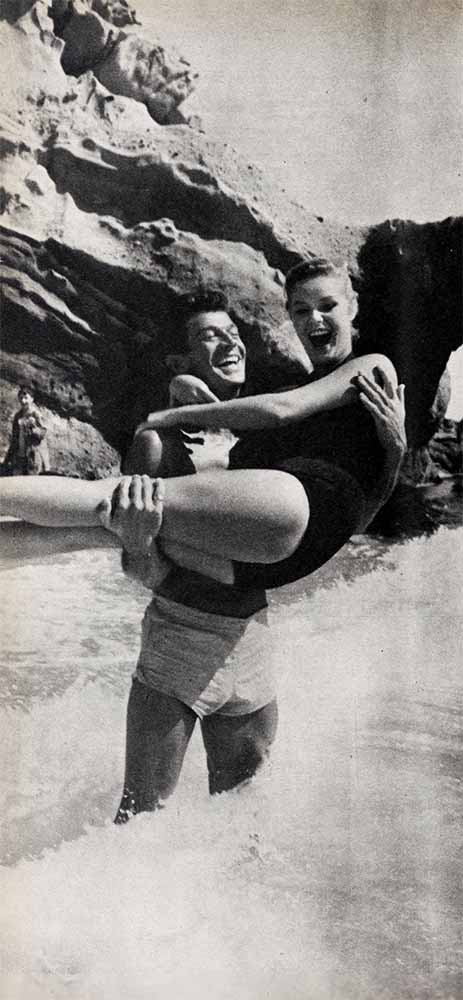
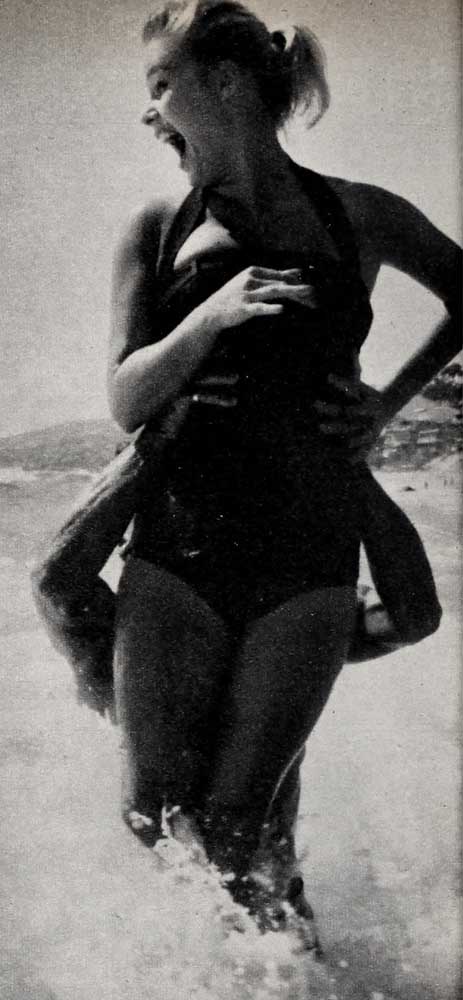
Even way back in high school I had the feeling I wanted to be a producer director. It’s something a corner of my mind still wants, but right now 99.9 percent of my attention is devoted to acting, and that’s what I’ll stick to until I get the chance to branch out. But the point is: It’s all still there, way back in a corner of my mind. I got my first chance to act at Occidental College, which I got to by design, and not accidentally (pardon the pun!). I was pledging for a fraternity, and one of my duties, in order to be voted into it, was to act as a murderer in a play written by one of my fraternity brothers. I’ve always said that “In the play, I murdered two actors, and every line I had to speak.” Nevertheless, from there on in, I knew I had to be an actor. Before I was graduated, I was elected President of the Dramatic Society.
I like people and like to have them around. People like the Bob Stacks and Rory Calhouns and Rock Hudson. Spending an evening with them, is, I think, the best possible way to spend an evening. How about you?
My first big picture was made in Bombay, India. (My leading lady was Ursula Thiess, who is now Robert Taylor’s leading lady in real life.) I did “Memory of Love,” in Sweden, and then “Carnival Story,” with Anne Baxter, which was filmed in Munich. So you see I covered a lot of mileage before I ever got my first real Hollywood movie break. But after that offers came fast and furiously.
Doing all that location-hopping taught me to appreciate travel, and I enjoy making pictures abroad. When Universal-International and I came to the parting of the ways last winter, I took assignments in London and Italy to make two pictures. I’m in Italy now, where (after hours) I’m pecking out this story on a typewriter.
Being a star has brought me lots of good things. For one, it given me a beautiful home in Sherman Oaks. It’s a hilltop place that you have to be a corkscrew-turn driver to be able to get to and I do my own cooking and cleaning—but not because I like it best that way. It would be fun to come home evenings to someone who was waiting there for me, with a fire going in the fireplace and dinner waiting on the table. I could get used to that very easily.
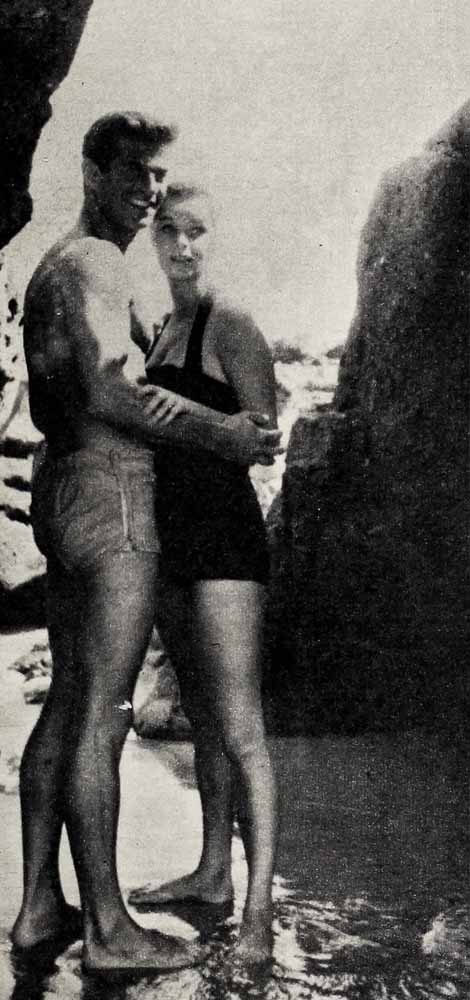
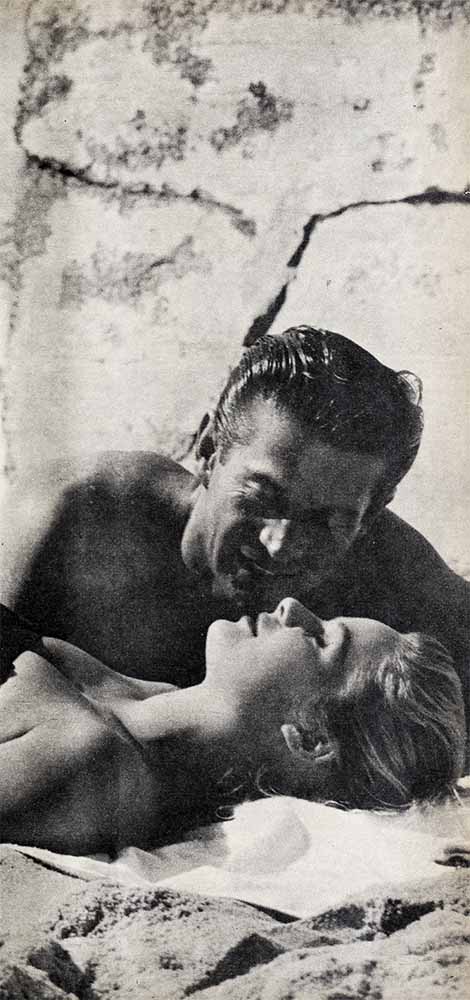
I think you would like my house. It’s a place where we can hoe the garden on Saturday mornings and cool off with a swim in my pool whenever we’ve a mind to. It also has (I’m sorry!) a bedroom that’s the messiest place in the house. That’s where I have a desk set up where I answer my fan mail personally and set aside those letters which are sent out by my secretary. That room always looks as though it’s in the process of being papered with postage stamps.
But the house has a lovely kitchen, all neat and efficient. I recognize that all it needs is a cheerful you in it, wearing a fluffy white organdy apron. (I’m partial to frilly aprons, no matter how impractical they are.) Very often I’ll take a couple of peanut butter sandwiches from home, so I can run through my paces at rehearsal and not waste time. (Hope you like making peanut butter sandwiches.) You see, I like my work and I get keyed-up when I’m working. At a TV rehearsal, for instance, I’m nervous as heck about whether I’ll be able to make my costume changes on time; whether I’ll be at the spot marked “X” when the camera shifts to there; whether I’ll be there for the longshots when the longshots are in order, and for the closeups when the closeups are needed. When I come home at night, maybe I’d like to spend an hour talking with you about me, but I’d hope you’d be interested —and I’d love you for being interested.
I’ll have to be honest. Stardom hasn’t given me a sense of financial security by any means. Right now I’m free-lancing, which means that I take a job when I like it, and when the picture appeals to me. It gives me a lot of personal freedom, and a sense of being my own man, but it isn’t exactly the most secure life in the world for an actor. And financial security is what I’d like to be able to offer my wife—if I had one. All of which brings me back to the subject of love.
A while back, the jukeboxes explained to us that love and marriage went together like a horse and carriage. They do? Does that mean like two objects, one living and the other inanimate, harnessed together for the purpose of going some place? That can’t be right. And is it really true that you can’t have one without the other? I doubt it, judging from the way so many people act in real life.
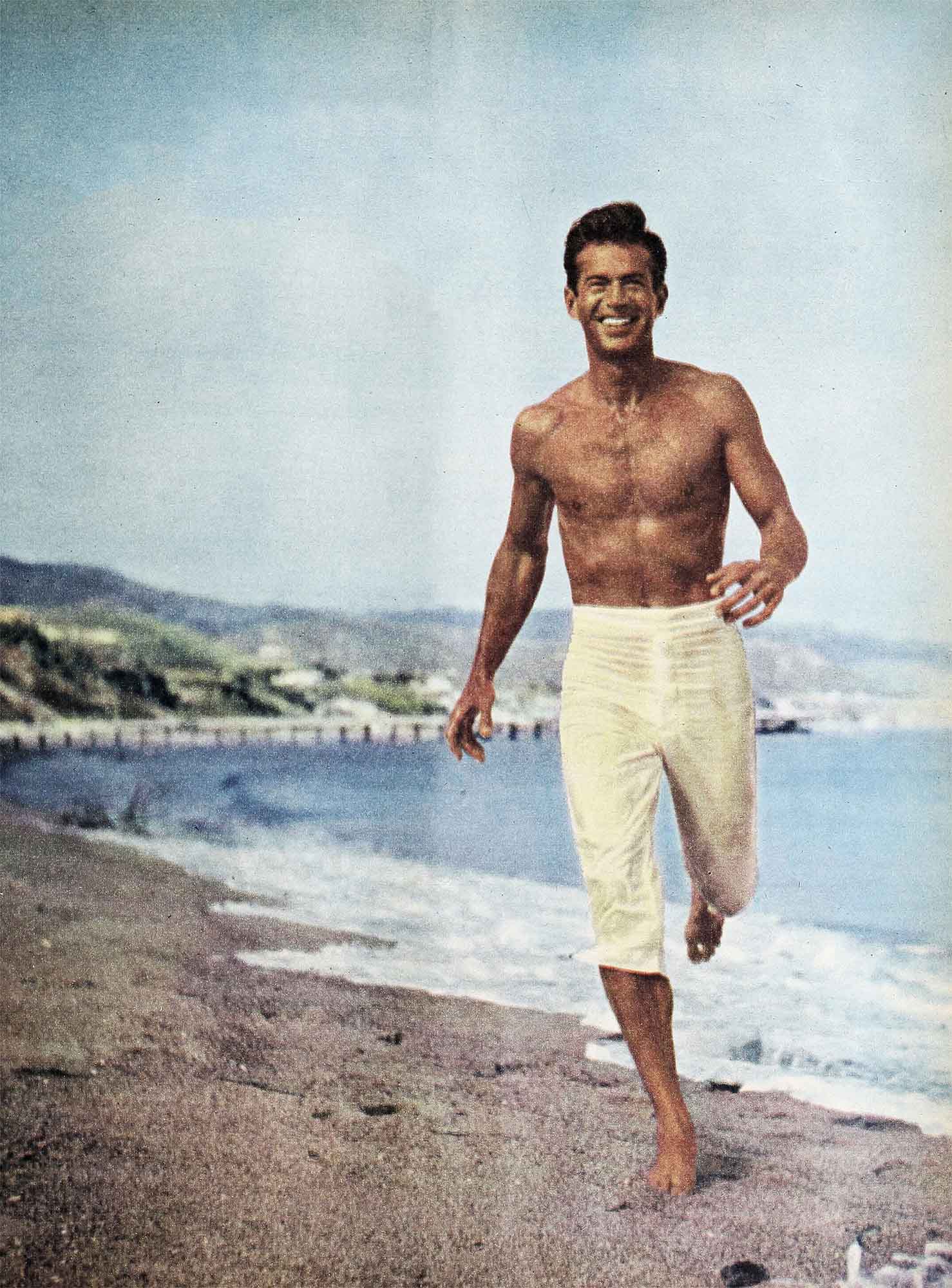
Now wait a minute—don’t get me wrong, I’m not making fun of marriage. And I’m not making fun of religion or of anyone’s church. But I am making fun of the jerks (a word, by the way, one can’t use on film—I wonder why, since it’s so descriptive) who are phony enough to say they believe in a set of values and then every day prove by their actions that they don’t.
What I mean is that a lot of people use the word “love” when they’re only talking about “sex,” and that’s what I object to. Love should imply a lot more than just sex drive.
You don’t just “fall in love with” or “fail for” someone and then start talking about getting married—not unless you’re merely thinking of what is only one part of the relationship. For sex is about as much related to love—to real love—as beets are to horseradish. It’s part of it, all right, but it takes on a completely different character.
To me, the main component of love is giving. No, I don’t mean “giving up” or “being deprived of” or “sacrificing” something. I mean that two people are giving of their joy, their understanding, knowledge, interest, humor and sadness, all the qualities that are alive in them—the qualities which set them apart from that dumb animal hitched to the cart we were talking about a while back.
I don’t claim these thoughts to be original. People far wiser and more experienced than I have written books about it. Dr. Erich Fromm wrote “The Art of Loving,” and I think it can clarify the subject for all of us. It costs only three dollars but to me it was worth a million—for it put into words all the things I’d been thinking about for years.
I do think about things, and you’d have to put up with some very definite views, if you were my girl. Because I love to argue, as you’d soon find out. If you’d hear some loud grumblings from the end of a dinner table, chances are it’d be your George, embroiled in a “discussion.” It might be about CinemaScope or misconceptions about love or about the fact that I hate people who sit around moaning There’ll never be another Jimmy Dean.” If you ever hear anybody say that around me, you might as well know my answer will be a rather heated, “That’s right, there will never be another Jimmy Dean—just as there will never be another Carole Lombard, another Jean Harlow, a Clark Gable, a Marlon Brando or a Marilyn Monroe—but why weep? There are still lots of fresh faces with real talent—newcomers who aren’t trying to be carbon copies. I know they exist.” I might not convince anyone, but I do believe in having my say . . . and I’d like you to put up with it!
I’m a movie fan myself, and I hope you’ll like the movies, too. It’d be fun to go together. But maybe, I hope, once in a while, you wouldn’t mind leaving before the end of a picture if it’s CinemaScope because I can’t stand CinemaScope—or at least, pictures which have nothing to offer aside from a wide screen. I think I’m fed up with being sold a bunch of mechanical processes which spread the picture far and wide across the screen. I think I’d rather be sold a batch of good pictures. For what makes a picture good isn’t CinemaScope or stereophonic sound or Vista-Vision or Todd A-O. A good picture starts with good writers, a good producer, a talented director, and competent actors. If you have that, then CinemaScope can help make it even better—but no picture ought to be asked to stand on CinemaScope alone. (I told you I’d be opinionated!)
Another thing: I don’t think pictures should be made “for everybody,” for I think we’ve learned the lesson that when pictures try to please everyone, they wind up not pleasing anyone. Different pictures can and should be made to have different kinds of appeal. The only thing they need have in common is the striving for quality. And you get ”quality” from the talent that goes into the making of a picture.
Speaking of talent, I was recently one of the judges in a nation-wide talent search. The four finalists, all of whom were eighteen or under, were excellent: full of natural talent, original in their approach to acting, each one a distinct personality and no one pretending to be someone else. It was clear that they hadn’t wasted their time perfecting another actor’s mannerisms or patterns of speech. They’d spent their energies on something worthwhile and important: developing themselves as individuals.
That’s something I’m a “bug” on. I don’t think that many of us take the chance to develop as individuals. TV, movies and all of our means of mass communications seem intent on getting us to dress a certain way, live a certain way and act a certain way. We’re developing into a country where “conforming” is the thing to do.
And I think it will hurt us as a nation.
To make a point, (people call me a “quote”), I’d like to quote Cameron Hawley on what his grandmother said in describing how the world had changed. I think it will bring home what I mean to say:
“I’ll tell you the one (change) I most regret. There used to be so many men who stood out as individuals. Now there are so few. More and more, all the time, it seems, men are yielding to some terrible compulsion to conform, to think alike and talk alike—yes, even to look alike.
“In those (older) days you could recognize any man who was worth knowing as far away as you could see him or hear the sound of his voice. Believe me, no one ever mistook your grandfather for someone else He was always his own man, thinking with his own mind, standing on his own feet. He knew that a man finds happiness only by walking his own path across the earth.”
This makes sense to me—except for, perhaps, that last sentence. It would be nice, I think, to have a pleasant companion while you were “walking your own path across the earth.”
When I find the right girl, I hope she’ll respect the fact that I have ray own ideas on a good many subjects, and that I like to express them. İ hope she’ll have them too, and that she’ll want to share them with me.
For instance, if you were my girl, I’d like you to read some of the authors I’ve read: Philip Wylie, Erich Fromm, Vance Packard. And to be able to think things through, and decide whether you agree with what you read, or whether you don’t. What fun it would be to have someone to share and argue a book through with My girl, I cross my fingers, would be that kind of person.
My ideal girl would like to think things through and decide what, in her opinion, made sense. And if she happened to agree with me—why so much the better. I’d gel a kick out of that. But whether we agreed or not, I’d know that she’d come to her own conclusion, just as I had, and that she wasn’t just trying to say “Me-too” just to please me. We’d both be individuals.
If you were my dream girl, you’d have a sense of humor You d have the ability to look at the bright side of things, and when something went wrong, you’d be able to laugh your way out of trouble. I don’t mean you’d have to be a joke-teller or life-of-the-party. Nope—because I’m not I’d just like to know you’re getting fun out of life.
I’m no great shakes, no Apollo, so if you were my girl, you wouldn’t have to be a beauty to look at (you’d be sweet and neat and good to look at: something like Ingrid Goude), but I would know that if you were all these things, you’d be beautiful within.
If you were my girl, you’d be an individual, and what I’d love about you would be the very things which set you apart from every other girl. And you’d like those things about me which make me different from every other man: those things which make me George Nader.
It wouldn’t matter to me whether you were older than I am, or a lot, lot younger than I. What would matter to me is that you’d want to understand things, and would want to know what is going on in the world around you. My girl will be interesting because she is interested.
We’ll have things we’ll want to share: like walking in the rain, and Irish stew, and building a fire in the fireplace and sitting around it and talking till the shadows lengthen and the firelight flickers. We’ll like books and music, and ideas and art. But most of all, we’ll like each other. For when you like the person you respect and love—well, then you’ve got something that dreams are made of. That’s true love, and if you feel as I do about some of the things I’ve talked about, you’d be more than just my girl—you’d be my wife.
THE END
It is a quote. PHOTOPLAY MAGAZINE JULY 1958


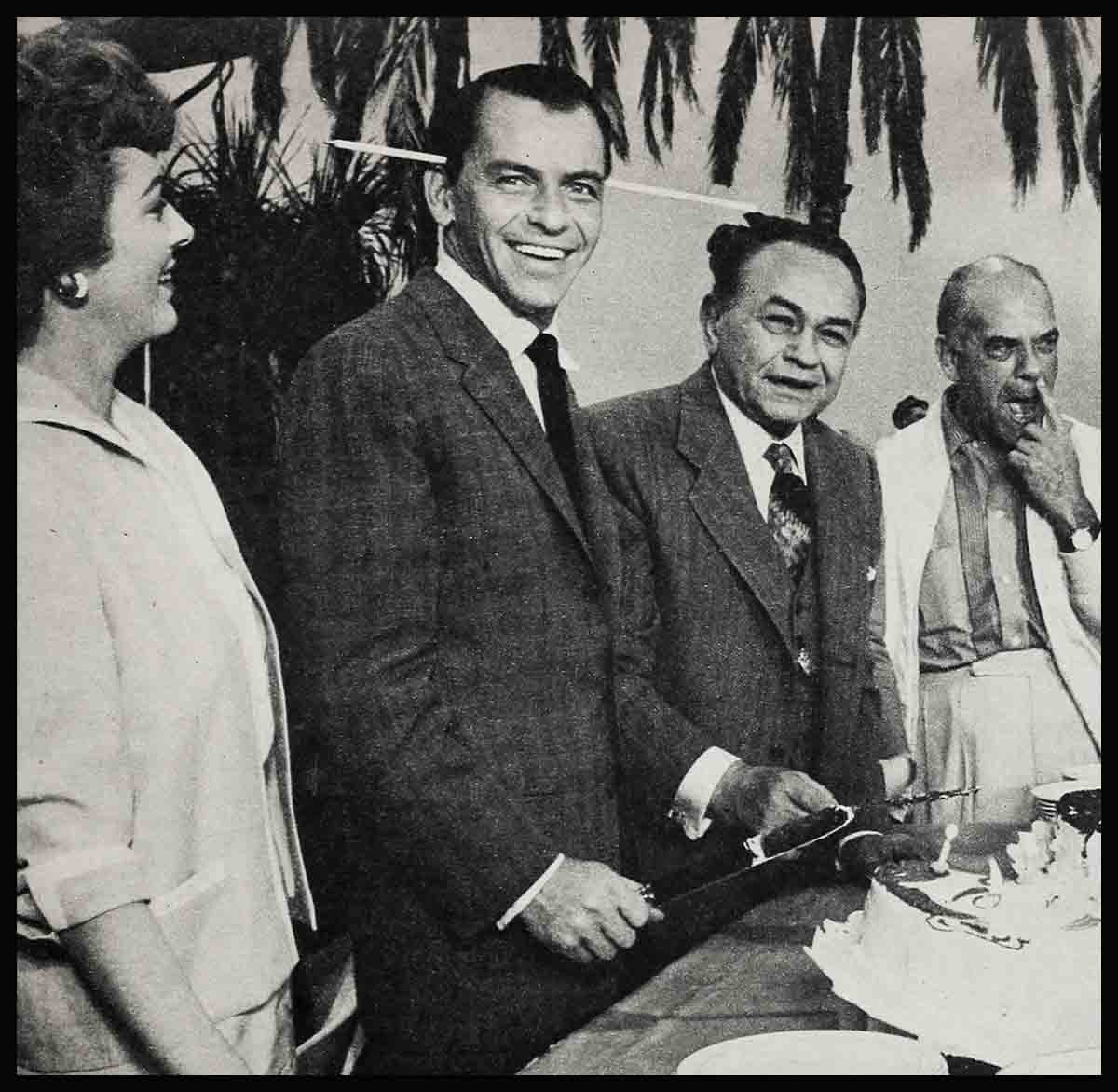

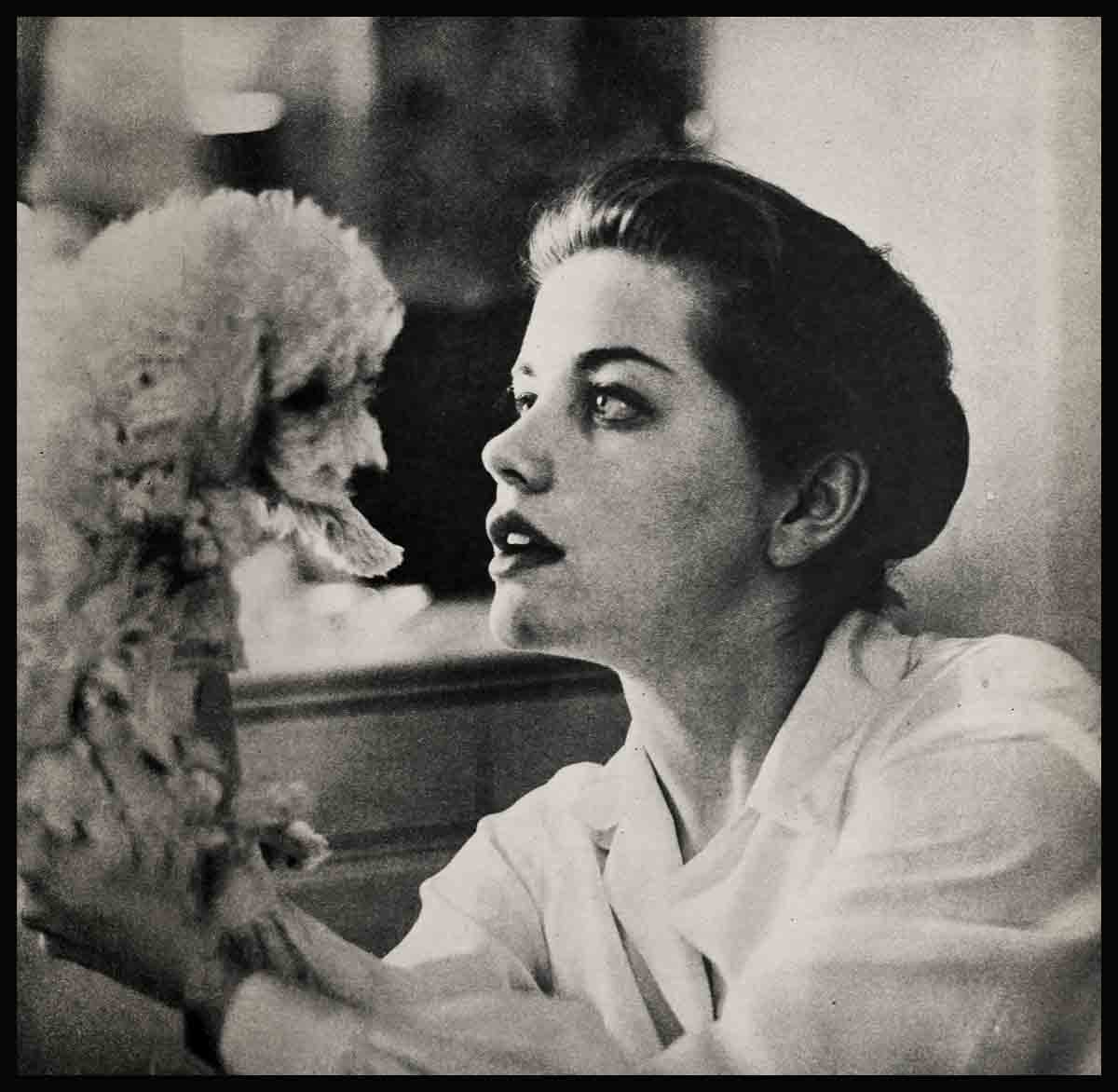
No Comments